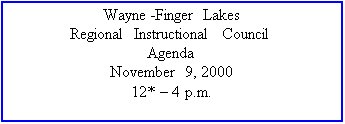5) The Instructional Council will provide leadership to the region using the following model:
STUDY
RECOMMEND ACTION
ASSIST IMPLEMENTATION
ASSESS EFFECTIVENESS
6) This Charge will be [revised] REVIEWED every three years, beginning in the spring of 1997. IT WILL BE UPDATED ANNUALLY.
7) THE INSTRUCTIONAL COUNCIL WILL EVALUATE ITS EFFECTIVENESS IN FULFILLING THE CHARGE ON AN ANNUAL BASIS.
 RETREAT ISSUES IN NEED OF
RETREAT ISSUES IN NEED OF
FURTHER DISCUSSION
FURTHER DISCUSSION
À
How do we (RIC) develop behaviors of High Performing Teams: Attitudes, Commitment, Skills?
À
Establish effective, efficient communication. Suggestions included establishing a listserve.
À
Consider co-chairing the RIC
À
Establish agenda advisory (similar to CSO) to include representation from Finger Lakes, Wayne, small district, large district.
À
Timed agenda items
À
New member orientation
À
ÔÇ£Buddy SystemÔÇØ for new members
À
Move meetings to morning
À
Opportunity for joint meeting with CSO, as needed
À
Identify agenda items for following meeting ÔÇô stick to it; no additions
Back to top






